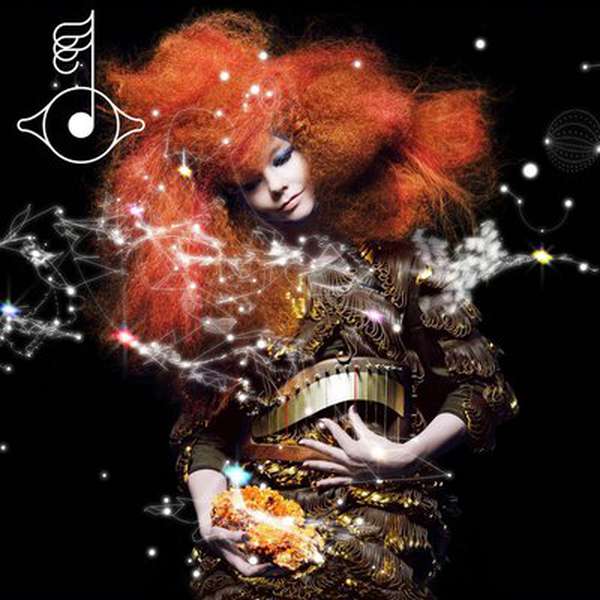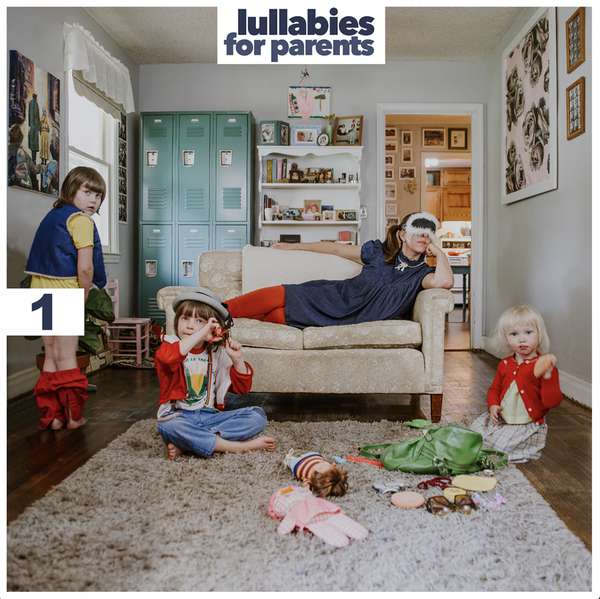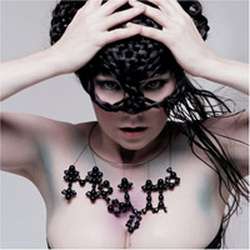I have immense respect for Björk. She combines all of the showmanship and bombast of pop artists like Lady Gaga with the complex and intricate composition skills of electronic artists like Aphex Twin. She's one of the few pop artists that continue to push their own creativity with every release, and it is more than clear on her eighth studio album, the media extravaganza that is Biophilia, that she remains dedicated to the growth of her music.
The most striking part about this album is the interplay between the heavily-structured pop/electronica sections and the ambient, free-form vocal arias; almost every song on the album features this kind of odd juxtaposition. The lead single "Crystalline" begins unassumingly enough, with a steady pulse of celesta and Björk's unnerving vocals. However, by the time we hit the chorus, she breaks out the drum machine, and the contrast is striking. Hell, the outro features a breakcore solo--and just when I thought the Amen break had run its course, too. One of the later tracks, "Mutual Core", begins with a quiet, church-like organ-based passage in 5/4. But even after the first stanza, you can hear the drum machine softly in the background waiting to break through in earnest. And when it does, we're treated to an amazing chorus with extremely heavy techno influences. It's hard to believe the two are part of the same song.
Actually, that's a very common sentiment for this album. It seems as if Björk is almost intent on making every song feel incredibly uncomfortable in some manner; the material here is a far cry from the heavily-structured pop tunes found on Debut or Post, and you definitely won't be tapping your toe to the majority of the songs. To that end, odd time signatures abound--this is may actually be the only album I know of that uses 17/8 on two separate pieces. The confusion is only heightened during the sections where Björk is singing without any kind of percussive backing to ground the time; "Dark Matter" in particular leaves you with almost nothing to grab a hold on to (actually, now that I write that out, it kind of makes sense for the song). Without a firm rhythmic grounding, you'll find yourself even more deeply immersed in Björk's distinctive singing. "Moon" sounds like she was trying to record soft vocals as aggressively as possible, and that quality along with the hypnotic backing vocals is a mesmerising combination. It's only approached by the impeccable backing vocal performances on the rest of the album, like on "Thunderbolt" or "Cosmogony" in particular. The latter pairs them alongside the warmest orchestral backing I've heard in a long while--you can definitely hear why she subtitles the song "Music of the Spheres".
The unusual instrumentation is also to be praised, for it gives each song an easily-recognizable and distinct character. The 'gameleste' in particular is an extremely versatile--compare the tinkling of "Crystalline" with the warm pan-drumming sound of "Virus" and you'll get a sense of what I mean. Most artists wouldn't be able to get away with such (let's just call it what it is) fucking around, but Björk's music is so diverse already that these instruments all fit in surprisingly naturally. Even the 'normal' instruments on this album are used irregularly; the huge, round brass in "Cosmogony" is definitely not your standard fare. And, let's face it, using a Tesla coil as an instrument is just flat-out cool, especially because it gives the arpeggiation in "Thunderbolt" a chrome-plated 80s quality. The forced half-note triplets over the 4/4 drum machine gives the song this inescapably entrancing quality. (I can only imagine how incredibly high the temptation to shock people with that instrument must be.)
What adds to all of this is that Björk is at the top of her lyrical game. In "Mutual Core", she sings about the tectonic plates with choice passages like "This eruption undoes stagnation / You didn't know I had it in me / Withheld your love, an unspent capsule / I didn't know you had it in you". She even manages to romanticize the idea of a virus: "Like a virus, patient hunter / I'm waiting for you, I'm starving for you / My sweet adversary". Granted, there is still a bit of lyrical tension, especially given that this is a concept album; songs like "Thunderbolt" definitely sound like the lyrics were forced into place at times out of necessity. However, songs like "Sacrifice" and "Solstice" more than make up for it with their incredibly smooth flow.
You may have noticed above that I described the album as a "media extravaganza". That wasn't mere literary fluff--there is quite the array of non-musical material to the album, almost all centred on the iPad. Ostensibly part of the album itself, each individual song on the album comes with an app that, according to Wikipedia, "includes a game related to the song, the score of the song created by Björk and Jónas Sen, animations and a musical essay written by Nikki Dibben". While that's all very well and good from an experimental perspective, I honestly don't care much at all about it. I have said before I don't like to judge single parts of a piece of art when it spans multiple media (like judging a film on its score alone), but it feels as if the extra stuff to Biophilia is supplemental, not integral, to the experience. Granted, the apps do augment the music very well; the game that goes along with "Virus", for example, actually illustrates the concept behind the song creatively and effectively. The apps in general also underscore the symbolism of the album in terms of marrying all aspects of life and the universe. But I can't help but feel that, if the apps were that crucial to how she wanted the album to be experienced, then she would have released it only in that format. It's like she's trying to have her experimental cake and eat it to, with the CD version of the album just as a backup in case the app experiment fails. It's not as if there isn't a precedent for a solely app-album; with Bluebrain's The National Mall, the app itself was literally integral to the experience of hearing the music. On that basis, I feel justified talking about the music of Biophilia alone. It's a bold move, for sure, and I will never criticize someone for taking a risk and experimenting with their art, but the album is good enough on its own without being unnecessarily bloated with stuff most people will not get a chance to experience alongside the music anyway. (Also, there's the fact that I don't own an iPad. Not that I'm bitter or anything.)
Regardless, this was still an immensely engaging and enjoyable album. It may be a little too over-the-top, and it can be easy to get lost in all of the flair and spackle that comes along with it, but if you focus and just listen to the music, you'll find this is one of the more rewarding albums of her career.



